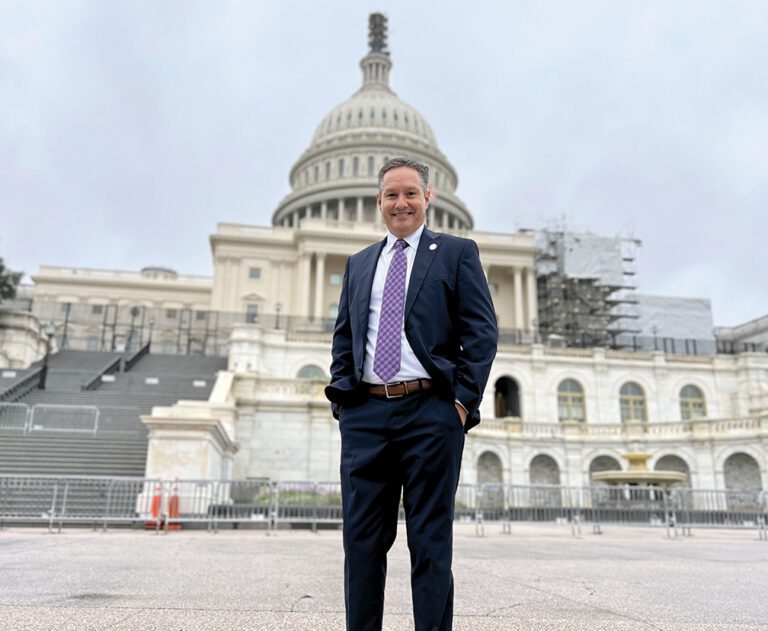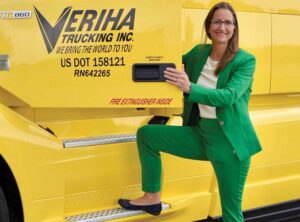For the rest of the world, 2023 is winding down as the winter holidays and the dawn of a new year approach. That’s not the case for the freight industry. Manufacturers and retailers are gearing up for a busy shopping season — and that means even more cargo will be moving along the highways of North America. At the Truckload Carriers Association (TCA), Chairman Dave Williams, along with TCA President Jim Ward and the rest of the team, are forging ahead with plans for 2024, from webinars, on-site meetings and seminars, and certification training to the association’s 2024 convention, scheduled for March 23-26 in Nashville, Tennessee. The Truckload Authority team recently had a chance to visit with Williams about the events of this year, including the group’s annual Call on Washington. Read the interview, conducted by Managing Editor Linda Garner-Bunch, below.
Linda: Can you believe it’s already November? You’re now past the halfway point in your year as chairman of TCA. What has been your most memorable experience since picking up the reins?
Dave: I have had a lot of great experiences, many of which I treasure. I don’t take any of them for granted. But for me, it’s more about seeing results; it’s about momentum. At each of our events, in everything that we do, we want to build value and make a difference. There are so many places our members can spend their time. For those that choose to spend time investing in the betterment of their company and giving back to the industry, we want to make sure we give them the best experience and the best opportunity possible. To me, this is not about reaching a destination. This is a process of building, reinventing, and improving. I get excited about that.
Linda: Of course, the highlight of September is always TCA’s Call on Washington. Please share a few thoughts on this year’s event.
Dave: We had a great event, with a record turnout. It was a thrill seeing almost 100 members line up on the steps of the U.S. Capitol and then descend on the halls of Congress to share the message of the truckload industry. This is what the process is all about! After splitting up into groups we were able to hold 90+ meetings in the offices of members of the House, the Senate, and other government agencies, including the Federal Motor Carrier Safety Administration.
We emphasized the continued need for funding and solutions for truck parking to aid our drivers as they continue to struggle to find safe parking. We even got commitments from two members of the Senate to add their names as co-sponsors to a bill that would allocate more funds to truck parking. We argued on the merits of eliminating the Federal Excise Tax and walked them through the obstacle that this tax has become as the industry struggles to invest in safety equipment and cleaner burning trucks.
We also spent quite a bit of time educating members of Congress and their staffs on the challenges associated with zero-emissions tractors.
Members of Congress take a lot of heat for their decision-making, and rightly so in many cases. But the number of topics and the complexity of those issues that they are making decisions on is amazing. Not one of them can be an expert in all these fields. So, to be able to give them real information, directly from the field, can really turn the tide in our favor. While it may not seem like it sometimes, our feedback is helping them see how challenging this effort to electrify the nation’s freight transportation industry truly is.
Linda: TCA’s Fall Business Meeting was also held in D.C. during the Call on Washington. What was this experience like?
Dave: Our Fall Business Meeting is one of those meetings that, if I’m being honest, needs some work. Don’t get me wrong — it was a good meeting, but we need to find a way to take it to the next level. It provides a great chance for our committees to get together and perform some of the association work, but we have some work to do in giving it that “make a difference” factor for our members in attendance. If you have thoughts or ideas, please share them with us. Stay tuned for next year!
Linda: One of the many pieces of legislation that would impact the trucking industry is a proposal to increase the weight limits on certain heavy-duty trucks. What is TCA’s stance on this, and why?
Dave: Any time you review a proposed piece of legislation, it is helpful to understand who benefits and who is potentially harmed. Win-win legislation is rare.
In the case of increased weight limits, the truckload industry is typically at risk for economic harm. Why is this the case? The answer comes in a couple of parts. One, the truckload industry charges by the mile, not by weight. More weight means more fuel cost and wear and tear on our equipment, but it usually does not lead to more revenue. Some will argue that shippers currently pay for more weight in some cases. That may be true, but that premium disappears as soon as the higher weight limit becomes standard.
The second part of this is that higher weight limits would likely end up causing a massive recapitalization of trailing equipment within the industry. An industry that already struggles with an appropriate ROIC (return on invested capital), would then be required to replace their current fleet with trailers that have a heavier weight rating (stronger floors, etc.), or trailers that have a third axle, depending on what is required. This capital outlay would have to be massive, because you would need to create new trailer pools large enough to cover your operating area. That is hard enough to do now, with trailers that are generally the same. Carriers would likely need to replace their entire fleet over time, switching to more flexible trailers capable of carrying all weight ranges in order to keep trailer ratios manageable.
There are lessons from the past, such as the shift from 48-foot trailers to 53-foot trailers, that we can learn from. In the end, carriers are at great risk for absorbing the cost of this recapitalization, putting margins at significant risk. This is already a capital-intensive business with relatively low risk-reward. Increased weight limits have the potential to make this industry even more financially challenging.
Linda: In early October, Congress narrowly averted a government shutdown through a bill providing temporary funding through November 17. As that deadline approaches, what impact would a government shutdown have on the truckload industry?
Dave: The impact of a government shutdown would vary based on each carrier’s freight mix. During a government shutdown, essential government workers are still theoretically required to work — but they don’t get paid until the shutdown is over. Short-term government shutdowns become more of a nuisance, while longer term government shutdowns present a greater economic risk. Someone hauling government-contracted freight may see a greater impact than someone hauling retail freight or freight generated from manufacturing activity. There are certainly indirect impacts, but most freight would move despite a government shutdown.
The bigger question to me is, how do we get to the point where we don’t have the threat of a government shutdown every 12 to 18 months? How do we overcome the dysfunction that has become the norm within our government? That’s a topic for another day.
Linda: While the predicted economic recession hasn’t occurred — at least yet — industry news is filled with headlines about the current freight recession. What exactly is a freight recession, and how can motor carriers best overcome the challenges it presents?
Dave: I am going to ignore a more formal definition of a freight recession, which has more to do with contracting volumes of freight year over year. To me, the more important concept is the all-important Law of Supply and Demand.
When supply (tractor capacity) and demand (freight volumes) are imbalanced, we end up with either a strong or a weak market. In a weak market, like the one we are in now, the number of trucks available exceeds the number of loads that need to be moved. The result of this discrepancy is a drop in freight rates. Simple as that.
Certainly, we have seen the hangover effect from the pandemic, including bloated inventories that have had an impact on freight volumes. It will take time for those inventories to come back into balance. But many economists are stating that the key to coming out of this particular down-cycle will likely come on the supply side, through the reduction of available tractors. Looking at tractor build data for 2023, tractor manufacturers are on pace to build somewhere around 340,000 new Class 8 tractors. That is substantially higher than the number of tractors being retired, which means capacity has grown this year, while freight volumes have been muted. That is oversimplified, but you get the point.
In order to balance the market again, we either need to see higher freight volumes (less likely) or we need to see less available trucks on the road. This is a tough business.
Linda: A short time ago, the Federal Motor Carrier Safety Administration stated that its suggested cap for speed limiters in trucks would be 68 mph. That statement was almost immediately retracted, and no limit has yet been established at the time of this conversation. Please share your thoughts on the use of speed limiters and the process of selecting a cap.
Dave: I have shared my thoughts on this previously and feel the need to state again that not everyone in the industry agrees on this issue. I respect that. That being said, I do believe slower speeds are safer (physics cannot be ignored) and more economically efficient (fuel economy). With improving technologies that assist in accident mitigation, this is not the same argument that we had 10 or 15 years ago.
Perhaps reconsidering the “one speed limit” standard approach is something we may need to explore. It may be that tractors outfitted with mitigation technologies are capable of going slightly faster than those not equipped. New technologies even have the ability to make speed limiting a dynamic process based on the speed limit rather than a top end limit only.
Whatever rule ends up coming out, there will be people unhappy with it. At the end of the day, the rule needs to be simple, and it needs to be soundly based on data and science. As an industry, we have done a great job over the years improving safety. I do believe, as unpopular in some circles as this may be, that speed limiters will help us get to the next level of safe operations. Rather than speculating further, let’s see what comes out and go from there.
Linda: In September, we celebrated National Truck Driver Appreciation Week. How did TCA and its member carriers show appreciation to drivers this year?
Dave: National Truck Driver Appreciation Week is a great opportunity to rededicate ourselves to the needs of our drivers and to celebrate their contributions to this nation. Members had a chance to hold various recognition events across the country.
From an association standpoint, we continue to discuss areas where we can really make a difference in getting things done for our drivers. Truck parking is our current focus on providing relief for our drivers. This process is much slower and more frustrating than it should be, but if that’s what it takes, then that’s what we’ll do. Sometimes we push for federal dollars, but rarely see the results of those dollars.
Recently I had the opportunity to meet with the director of the Arizona Department of Transportation in my home state of Arizona. She walked through what Arizona has done with the last round of truck parking funding including opening three rest stops that were previously closed, increasing the number of available highway parking spots in Arizona by a meaningful amount. She also talked about plans to use state land, where possible, to add even more spots. In other words, these dollars that we are fighting for really do make a difference for our drivers!
We also need to find other ways that we can improve our drivers’ quality of life. While we celebrate them one week of the year, we will continue to advocate for them every day.
Linda: The California Air Resources Board continues to push the envelope on environmental regulations leading to a confusing compliance path that many carriers are struggling to keep up with. Is this something TCA members should be concerned about?
Dave: Absolutely! There have been so many changes in just the last few months that it is becoming very difficult to follow.
Starting January 1, 2024, new diesel trucks will no longer be able to be added to the California drayage registry, meaning they can’t enter ports or rail yards. Any new trucks have to be zero-emissions if they want to do work in California ports or rail yards.
In 2024, California will begin its Heavy Vehicle Inspection program. This will require emissions data to be sent to the state through a download or via telematics along with a fee (of course). Various portions of the Advanced Clean Fleet Rule and the Advanced Clean Trucks Rule start to kick in. These rules are very complicated and have declarations and reporting that is required in the coming months. There are new reefer unit rules starting in 2024 that require a fee and new decals that come from the state. It’s an absolute mess!
California also has a track record of coming to fleets several years after a new rule kicks in and auditing for compliance. So, if you think that they are not enforcing the rules, think again … they can issue big fines.
There are going to be legal challenges, but not all these rules are being challenged. I would strongly encourage TCA members to find someone to help navigate through these various regulations. If you don’t do business in the state of California, that doesn’t mean that you are off the hook. Many states have adopted or are considering adopting portions of these rules.
Like I said, it’s a hot mess. But don’t put your blinders on and hope it goes away. Stay informed, and protect your company.
Linda: As senior vice president of equipment and government relations for Knight Transportation, fleet safety must be a subject that’s near and dear to your heart. How does TCA work to provide its member carriers with the tools they need to ensure fleet safety?
Dave: For anyone that has lost a loved one due to an accident, or had their life permanently altered due to an injury, ask them what safety means to them. It means everything. They had plans and dreams, and all of that changed in an instant. We must take that seriously.
When you look at companies that are the best in class for safe operations, it doesn’t just happen. They work at it. They have critical measurements that they watch, they have processes that they follow, they set standards, they train and re-train, everything they do is intentional. Everything action has a purpose. Many of those carriers are willing to share what they do. They share in our benchmarking groups, they share in our educational webinars and on conference panels, they share in private conversations.
If you are a carrier that struggles with safety performance, then you need to engage. You know what you know, and don’t know what you don’t know. Knowledge is powerful. Comparing data and knowing where your weaknesses are is even more powerful. That is one of the great values that TCA provides, bringing carriers together to achieve a common cause — in this case, improving highway safety. For those who are interested, the TCA is in the process of forming a benchmarking-type group that solely focuses on safety. If you are interested in participating, please reach out to David Heller for more details.
Linda: As noted earlier in the conversation, 2023 is coming to an end, and the winter holiday season is upon us. Do you have any thoughts to share with our readers?
Dave: Thank you to all of those who dedicated their time and their resources to making this a better industry. Your efforts are not always acknowledged, but they are truly appreciated. We have so much to accomplish. Let’s stay after it!
Linda: Thank you for your time, Mr. Chairman. I look forward to our next conversation.
This article originally appeared in the November/December 2023 edition of Truckload Authority, the official publication of the Truckload Carriers Association.
Linda Garner-Bunch has been with The Trucker since 2020, picking up the reins as managing editor in 2022. Linda has nearly 40 years of experience in the publishing industry, covering topics from the trucking and automotive industry to employment, real estate, home decor, crafts, cooking, weddings, high school sports — you name it, she’s written about it. She is also an experienced photographer, designer and copy editor who has a heartfelt love for the trucking industry, from the driver’s seat to the C-suite.














